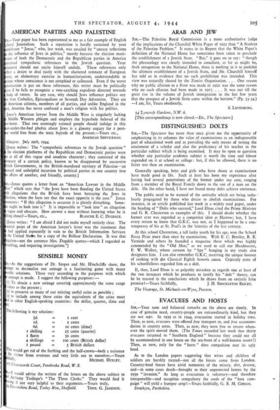AMERICAN PARTIES AND PALESTINE
a,—Your paper has been represented to me as a fair example of English iberal Journalism. Such a reputation is hardly sustained by your tributor " Janus," who, last week, was assailed by "uneasy reflections the influence of Jews in politics," merely because the election math- toes of both the Democratic and the Republican parties in America 'stained sympathetic references to the Jewish question. Your umnist should not excite himself unduly. These references only flect a desire to deal justly with the shattered remnant of European wry, an elementary exercise in humanitarianism, understandable to gone whose conscience is not atrophied or calloused. Even if the worst nstruction is put on these references, this writer must be politically ye if he fails to recognise a vote-catching expedient directed towards body of voters. In any case, why should Jews influence politics any ,s than Catholics, Episcopalians or Seventh Day Adventists. They are American citizens, members of all parties, and unlike England in the st, America has never confused a man's religion with his politics.
Janus's American lawyer from the Middle West is singularly lacking Middle Western phlegm and employs the hyperbole beloved of the w-hater. That two seemingly rational people should indulge in this an-under-the-bed phobia about Jews is a gloomy augury for a post- ai- world free from the toxic hatreds of the present.—Yours etc.,
AMERICAN SERVICEMAN.
Glasgow. 7uly 29th, 1944.
[Janus writes: The " sympathetic references to the Jewish question " the election platforms of the Republican and Democratic parties were t at all of this vague and anodyne character ; they consisted of the weary of a certain policy, known to be disapproved by successive ritish Governments, in the British-mandated territory of Palestine—an usual and unhelpful incursion by political parties in one country into affairs of another, and friendly, country.]


























 Previous page
Previous page